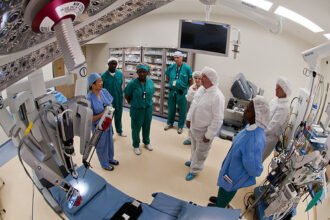I woke up today and found a weird headline in my inbox: “Med School Debt May Push Docs to Primary Care.” It struck me as weird because I thought it was commonly agreed that the effect is the opposite. To the extent choice of specialty is motivated by concerns over debt repayment, it should push doctors to sub-specialties like radiology, oncology and orthopedics that pay a multiple of what primary care gets paid.
I woke up today and found a weird headline in my inbox: “Med School Debt May Push Docs to Primary Care.” It struck me as weird because I thought it was commonly agreed that the effect is the opposite. To the extent choice of specialty is motivated by concerns over debt repayment, it should push doctors to sub-specialties like radiology, oncology and orthopedics that pay a multiple of what primary care gets paid. Of course the training is longer but the financial payoff over the course of a career is pretty clear.
Reading a little further into the article, and then reviewing the primary source (Pediatric Resident Debt and Career Intentions ) it turns out this story is about pediatrics and that the causal relationship –if any– is modest. Pediatric residents with more debt are somewhat less likely to say they will pursue a specialty that requires fellowship training. Meanwhile over the past few years, as debt levels have increased, pediatric residents have actually been expressing a higher interest in sub-specialties and a lower interest in primary care, which begs the question of why this article was written in the first place. (We also need to be careful about extrapolating findings from pediatrics to adult medicine considering that pediatric compensation, including for sub-specialities, is lower.)
Stepping back a bit from this article, I would reframe the topic as an examination of the impact of high and rising medical school debt on the physician workforce. I would like to see more attention given to questions such as:
- Why is the level of debt rising in the first place? To what extent is it due to rising medical school tuitions? What role does undergraduate debt play in overall educational debt for doctors?
- How much does debt affect the decision to go into medicine in the first place? Why did the residents surveyed here (all of whom were in pediatrics) decide to go into pediatrics at all despite the fact that incomes tend to be lower?
- To what extent is the trend toward more medical debt interfering with national priorities? For example, what will be the cost to Medicare, Medicaid and private payers in terms of future medical bills as a result of training more sub-specialists at a time when there are shortages in primary care? What would be the ROI if the government paid more medical school tuitions in exchange for certain workforce commitments?
- What policy solutions are available to address the debt issue? For example, can debt forgiveness programs like the National Health Service Corps play in encouraging more primary care and a more even geographical distribution of physicians?
- What is the responsibility of medical schools in all of this?
The medical debt issue is an important one, which I’d really like to see addressed at multiple levels. However, I don’t think it’s helpful to the debate to be spreading the word that more debt equals more primary care.







